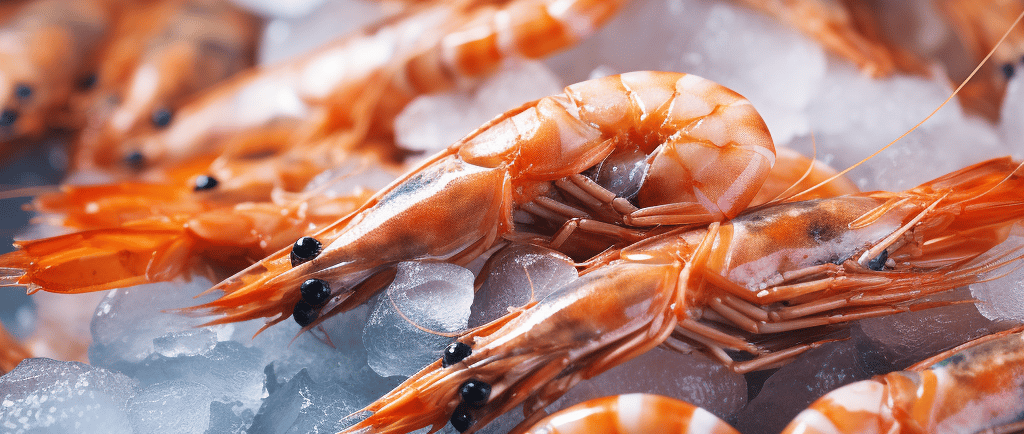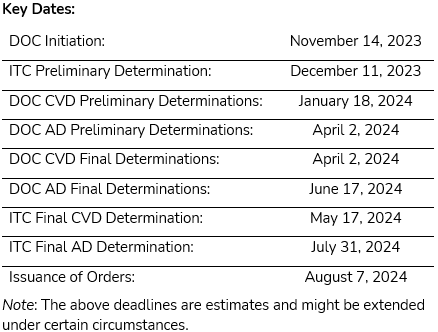Frozen Warmwater Shrimp from Ecuador, India, Indonesia, and Vietnam
U.S. launches antidumping & countervailing duty investigations and amended scope of the investigations


The American Shrimp Processors Association (“Petitioner”) filed trade petitions against imports of frozen warmwater shrimp on October 25, 2023. The petitions seek the imposition of antidumping (“AD”) duties on imports from Ecuador and Indonesia, and countervailing duties (“CVD”) on imports from Ecuador, India, Indonesia, and Vietnam.
The petitions were filed with the two U.S. agencies involved in antidumping and countervailing duty investigations, the U.S. International Trade Commission (ITC) and the U.S. Department of Commerce (DOC).
The value of the subject imports in 2022 was about 6.7 billion USD.
Historical Background:
AD duties are currently in effect on imports of frozen warmwater shrimp from China, India, Thailand, and Vietnam. Those AD orders have been in effect since 2005. In 2012, U.S. producers of frozen warmwater shrimp had also filed petitions for the imposition of CVDs on imports from China, Ecuador, India, Indonesia, Malaysia, Thailand, and Vietnam. But those CVD petitions did not result in the imposition of CVD orders. Although DOC determined that countervailable subsidies were provided to the producers or exporters from China, Ecuador, India, Malaysia, and Vietnam, the ITC determined that the U.S. industry was not materially injured.[1]
The Focus of the Investigations:
The DOC will calculate the dumping margins and countervailable subsidy rates for foreign exporters of frozen warmwater shrimp.
The ITC will assess whether imports from Ecuador, India, Indonesia, and Vietnam are causing material injury to the U.S. shrimp industry.
Dumping refers to the act of a foreign company selling a product in the U.S. at a price below its normal value. This value is determined by the foreign company’s sales in its home market, sales in a comparison market, or even below cost. In essence, this process evaluates price discrimination. Such analysis produces a percentage termed the "margin of dumping." The Petitioner alleges the following dumping margins for exporters of frozen warmwater shrimp:
Ecuador - 1.3 - 111.4 percent ad valorem
Indonesia - 4.85 - 37.36 percent ad valorem
Countervailable subsidies are financial assistance from foreign governments that benefit the production, manufacture, or exportation of goods and are specific to the exporter, industry, or geographic region (countervailable subsidies). These subsidies may be in the form of discounted loans, tax breaks, direct grants, or low-cost rent, etcetera. Petitioner alleges numerous countervailable subsidy programs for producers and exporters of frozen warmwater shrimp:
Ecuador - twenty-two programs
India - eighteen programs
Indonesia - fifteen programs
Vietnam - forty programs
There is some historical reference for the duties those subsidy programs might translate into. The following were the countervailable subsidy rates determined by the DOC in 2013 for certain frozen warmwater shrimp producers and exporters, but as mentioned above, no CVD orders were published because of the ITC’s no injury determination:
China - 18.16 percent ad valorem
Ecuador - 10.13-13.51 percent ad valorem
India - 10.54-11.14 percent ad valorem
Malaysia - 10.80-54.50 percent ad valorem
Vietnam - 1.15 to 7.88 percent ad valorem.
Mandatory Respondents
For countries with a vast number of producers and exporters of frozen warmwater shrimp, the DOC is expected to examine only two companies. Typically, these companies are chosen based on their export volume to the U.S. They will be mandated to actively participate in the investigations. Moreover, the dumping margins and countervailable subsidy rates determined for those companies will likely set the duty rates for other producers and exporters.
Injury investigation initiation notices are usually published immediately after the petitions are filed. The ITC will have 45 days to reach a preliminary determination. Producers, importers, and exporters can participate in this investigation by responding to questionnaires about the production, importation, and sales of frozen warmwater shrimp. These questionnaire responses are due on November 8, 2023. All mentioned parties can also defend themselves at the ITC against claims that imports are harming the U.S. industry.
Retroactive duties may be required for merchandise currently in transit or expected to be shipped soon. The additional duties normally become effective when the DOC makes the affirmative preliminary determinations. However, if Petitioner alleges critical circumstances and dumping or subsidization is determined, imports arriving post-October 25, 2023 (petition filing date) but prior to the AD and CVD preliminary determination dates could face retroactive cash deposits.
REQUESTED SCOPE OF MERCHANDISE UNDER CONSIDERATION
The scope of these investigations includes certain frozen warmwater shrimp and prawns whether wild-caught (ocean harvested) or farm-raised (produced by aquaculture), head-on or head-off, shell-on or peeled, tail-on or tail-off, deveined or not deveined, cooked or raw, or otherwise processed in frozen form.
The frozen warmwater shrimp and prawn products included in the scope, regardless of definitions in the Harmonized Tariff Schedule of the United States (HTSUS), are products which are processed from warmwater shrimp and prawns through freezing and which are sold in any count size.
The products described above may be processed from any species of warmwater shrimp and prawns. Warmwater shrimp and prawns are generally classified in, but are not limited to, the Penaeidae family. Some examples of the farmed and wild-caught warmwater species include, but are not limited to, whiteleg shrimp (Penaeus vannemei), banana prawn (Penaeus merguiensis), fleshy prawn (Penaeus chinensis), giant river prawn (Macrobrachium rosenbergii), giant tiger prawn (Penaeus monodon), redspotted shrimp (Penaeus brasiliensis), southern brown shrimp (Penaeus subtilis), southern pink shrimp (Penaeus notialis), southern rough shrimp (Trachypenaeus curvirostris), southern white shrimp (Penaeus schmitti), blue shrimp (Penaeus stylirostris), western white shrimp (Penaeus occidentalis), and Indian white prawn (Penaeus indicus).
Frozen shrimp and prawns that are packed with marinade, spices or sauce are included in the scope. In addition, food preparations, which are not “prepared meals,” that contain more than 20 percent by weight of shrimp or prawn are also included in the scope.
Excluded from the scope are: (1) breaded shrimp and prawns (HTSUS subheading 1605.20.10.20); (2) shrimp and prawns generally classified in the Pandalidae family and commonly referred to as coldwater shrimp, in any state of processing; (3) fresh shrimp and prawns whether shell-on or peeled (HTSUS subheadings 0306.36.0020 and 0306.36.0040); (4) shrimp and prawns in prepared meals (HTSUS subheading 1605.20.05.10); (5) dried shrimp and prawns; (6) canned warmwater shrimp and prawns (HTSUS subheading 1605.20.10.40); and (7) certain battered shrimp. Battered shrimp is a shrimp-based product: (1) that is produced from fresh (or thawed-from-frozen) and peeled shrimp; (2) to which a “dusting” layer of rice or wheat flour of at least 95 percent purity has been applied; (3) with the entire surface of the shrimp flesh thoroughly and evenly coated with the flour; (4) with the non-shrimp content of the end product constituting between four and ten percent of the product's total weight after being dusted, but prior to being frozen; and (5) that is subjected to IQF freezing immediately after application of the dusting layer. When dusted in accordance with the definition of dusting above, the battered shrimp product is also coated with a wet viscous layer containing egg and/or milk, and par-fried.
The products covered by the scope are currently classified under the following HTSUS subheadings: 0306.17.0004, 0306.17.0005, 0306.17.0007, 0306.17.0008, 0306.17.0010, 0306.17.0011, 0306.17.0013, 0306.17.0014, 0306.17.0016, 0306.17.0017, 0306.17.0019, 0306.17.0020, 0306.17.0022, 0306.17.0023, 0306.17.0025, 0306.17.0026, 0306.17.0028, 0306.17.0029, 0306.17.0041, 0306.17.0042, 1605.21.1030, and 1605.29.1010. These HTSUS subheadings are provided for convenience and for customs purposes only and are not dispositive, but rather the written description of the scope is dispositive.
[1] Frozen Warmwater Shrimp from China, Ecuador, India, Malaysia, and Vietnam, 78 Fed. Reg. 64,009 (Comm'n, Oct. 25, 2013) (final determination of no injury).






